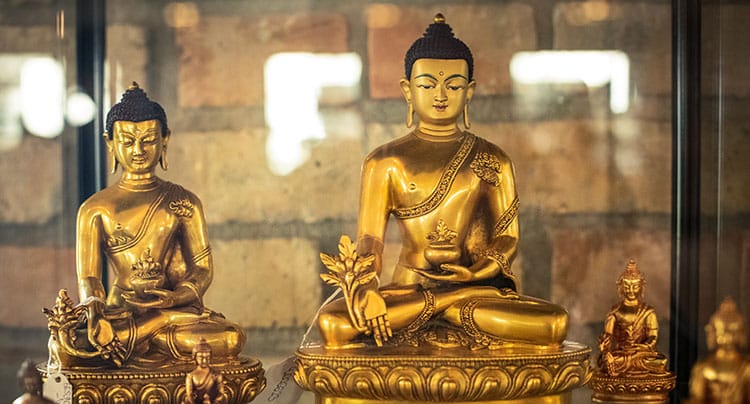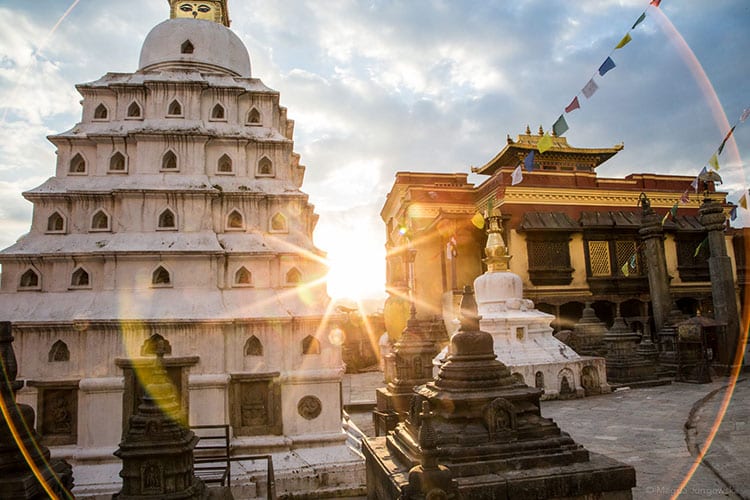The Meaning and Importance of Sangha
Category: Buddhist Path

Understanding the meaning of Sangha in Buddhism
The three jewels of Buddhism function as three legs of a tripod. All three – Buddha, Dharma and Sangha – are equally vital supports for those on the Buddhist path. Each has distinguishing characteristics, and yet the three are interdependent. Our awakening depends on us taking refuge in all three jewels.
The Buddha serves as an example of an ordinary human being who realized complete freedom from his suffering. The Dharma encompasses the Buddha’s teachings. But what is sangha, and why is it just as valuable as the first two? Understanding the meaning of sangha can help us realize its value, and can help us connect to our own.
Defining Sangha
The definition of sangha, a Sanskrit word, might be described as fellowship, community, company or collection. It is the assembly of those who follow the Buddhist path. In some traditions, Sangha refers only to ordained monks and nuns.
There is a different meaning when we use the term Noble Sangha – this refers to realized beings, arhats or bodhisattvas who have overcome the causes of suffering, but are not yet fully realized buddhas. This is important, in that when we take refuge in the three jewels, we do so with the Buddha, the Dharma and the Noble Sangha. These three help us see the truth, and are undeceiving in nature. But in this article we’ll refer to “little s” sangha of a community of practitioners, not the noble “big s” Sangha of realized folks.
The term may also encompass all those who have taken refuge in the three jewels, or anyone who has an interest in turning inward for a lasting solution to their pain. The Buddhist teacher Thich Nhat Hanh says we might even consider our meditation cushion or nature’s beauty as members of our sangha, for sangha is anything that offers us support along the Buddhist path.
Sangha as Support
It’s not always easy to stay on the spiritual path. We’re constantly distracted by people and circumstances who test our patience, push our buttons, or in the least, keep us too busy to meditate. Surrounding ourselves with like-minded others makes adhering to our practice more likely. In a sangha where everyone is practicing right view, it becomes easier for us to remember this, too.
But the sangha isn’t only a means of receiving support, it also offers us the opportunity to lend support to others. To take refuge in the sangha is not merely a passive act of devotion, but an essential, active practice. Learning and growing in community is a reminder that although the Buddhist path offers individual freedom, it’s not only all about us.
Meditation is often seen as an individual pursuit. But our practice is not complete if the benefits end with us. As members of a sangha, we’re responsible not only for our personal growth, but for contributing to a positive environment that fosters the growth and wellbeing of others. This spiritual fellowship serves as an antidote to individualism and the self-centered focus at the root of all our suffering. This is one reason it is often said that without the support of the collective, a practitioner won’t get very far.
The Sangha as a Mirror
In a healthy Buddhist sangha, the overarching energy is mindful and aware, supportive and safe, compassionate and wise. There is no demand for perfection, but a loving expectation of growth.
When we view imperfection in our fellow sangha members, we might choose to see it as a gift. Injustices or transgressions are not to be ignored, but to be faced, compassionately dealt with, and then let go of, just as we would handle these same faults if we observed them in ourselves. In fact, the sangha serves as a mirror through which we might better recognize our faults. To refrain from the ten misdeeds when alone is one thing, but how do we act in the company of family or friends?
Above all, the sangha helps us coax open our hearts. The bigger our hearts, the easier it is to give ourselves and others grace. The sangha is a playground in which we might practice seeing all beings as potential teachers, just as they are. The sangha is a ground for transformation.
Where to Find Your Sangha
Some say we’re the energy of the people we spend the most time with. Whether we know it or not, we’re each in a community right now. Upon realizing this, we’re invited to become more mindful of what type of energy we’re contributing to our crew.
As human beings, we cannot remove ourselves from community, nor should this be the goal. By consciously following a spiritual path, we have the opportunity to root ourselves in community in a more meritorious, beneficial way. By centering our practice here and now, among our fellow humans, we’re reminded that our teachers, and the nirvana we’d like them to guide us to, exist nowhere else but here.








